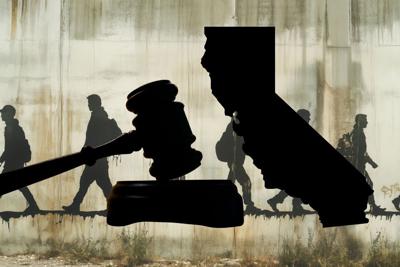
California often presents itself as a champion of rights and due process. But in practice, the state operates on a split-screen: one justice system engineered with constitutional shock absorbers, like an East Los low rider, and another whose foundation rests on a legal fiction that erases rights at scale.
On one side is the fully padded system reserved for people facing federal criminal charges, people with resources, visibility or institutional standing. In that world, every Fourth, Fifth and Sixth Amendment concern is treated as urgent and delicate. Federal judges issue twenty-four-page opinions over whether investigators overreached when seizing materials, or whether a case agent might have brushed up against attorney-client privilege. Courts even assign special judges to manage disputes over privileged files. These defendants see every procedural step scrutinized, documented and weighed, as if due process itself were an endangered California species.
And then there is the other system, California’s immigration detention reality, built on the legal fiction that deportation is “civil,” not criminal. That single doctrinal move strips away the right to government-funded counsel, a protection that would be automatic in a criminal case. The Immigration and Nationality Act promises a “right to counsel,” but only “at no expense to the government,” effectively limiting representation to those who can afford it.
Most cannot.
Without lawyers, detainees cannot meaningfully exercise even their basic negative rights, including freedom from unreasonable seizure. ICE can rely on broad suspicion, perceived ethnicity or the simple fact of standing outside a Home Depot or waiting in a parking lot. Unlike federal criminal courts, immigration courts apply lower procedural standards, fewer safeguards and limited oversight.
California’s geography worsens the divide. Detention centers are clustered in remote locations – Adelanto, Otay Mesa and Mesa Verde – far from the state’s legal hubs. Phone access is unreliable or monitored, making confidential communication with attorneys nearly impossible. In documented Los Angeles cases, officers insisted on leaving doors open during attorney-client meetings, undermining confidentiality even after court intervention.
The effects are measurable: represented detainees are far more likely to be released or win protection, yet California keeps nearly 90% of its immigration detainees in private, for-profit facilities, many operating under bed guarantees that incentivize full capacity. Conditions remain punitive, with reports of medical neglect, prolonged isolation and even sewage rising through drains, circumstances that pressure detainees into abandoning their legal claims simply to escape the environment.
The contrast is stark.
One system devotes pages of judicial analysis to the seizure of a five-year-old Blu-ray disc in a privileged defendant’s case. The other routinely denies the most basic elements of due process to people whose entire futures hinge on the outcome.
California’s justice landscape isn’t just uneven, it’s structurally contradictory. The state that prides itself on rights protection simultaneously sustains a detention regime that operates with fewer safeguards than any criminal court. The result is a dual system: one with constitutional padding, and one where rights are optional, fragile, or withheld entirely.











(0) comments
Welcome to the discussion.
Log In
Keep it Clean. Please avoid obscene, vulgar, lewd, racist or sexually-oriented language.
PLEASE TURN OFF YOUR CAPS LOCK.
Don't Threaten. Threats of harming another person will not be tolerated.
Be Truthful. Don't knowingly lie about anyone or anything.
Be Nice. No racism, sexism or any sort of -ism that is degrading to another person.
Be Proactive. Use the 'Report' link on each comment to let us know of abusive posts.
Share with Us. We'd love to hear eyewitness accounts, the history behind an article.